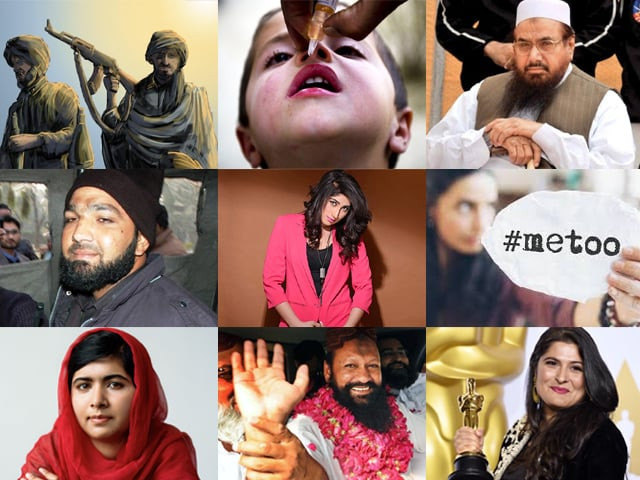However, have you ever read about an issue and thought, “wow, this seems pretty black and white to me”? And then seen the reaction of people around you, as they somehow invent new colours just to add more sides to seemingly uncomplicated issues?
This is quite frequently the case in Pakistan, where we often find ways to blame the victim and make the perpetrator seem justified in his or her actions. Here are only some instances where the majority has taken a rather unconventional stance on ostensibly obvious issues:
1) Qandeel Baloch
Qandeel was a young woman who was mocked on social media on a regular basis – but she was also slut-shamed and demeaned on an equally regular basis. Even after she was murdered in the name of honour, people went to the extent saying that she was to blame, as her actions left her brother no choice but to murder her. ‘Asking’ to be murdered – only in Pakistan, ladies and gentlemen.
2) Malala Yousafzai
Malala’s biggest mistake is that she revealed what happened during the Taliban’s regime and, after they tried to murder her, received international attention for it. People in Pakistan hate Malala – especially because she gets to live in the UK while we are stuck here. Why doesn’t she come back to Pakistan? It’s not like we hate her here and almost succeeded in murdering her. Why doesn’t she do more for Pakistan? It’s not like she’s still a teenage girl while the grown men we call politicians have failed to do anything remarkable for the country in decades.
Only in Pakistan would you see that when the Taliban tries to kill a teenage girl and fails, the people support the terrorist organisation and demonise the teenage girl. You may believe that Malala is part of a western agenda or a yahoodi saazish (Jewish conspiracy), but ultimately, a Pakistani girl was almost murdered in her own land, and perhaps we hate that she lived to tell the tale.
3) Mumtaz Qadri
You would think that if a guard, sworn to protect someone, ends up murdering them in broad daylight, we would obviously have issues with that, right? Wrong.
Qadri killed the very man he was supposed to protect, Salman Taseer, in cold blood, but Taseer had also spoken out against the blasphemy law being unfairly used against minorities, a crime which a significant majority in Pakistan felt that he deserved to be killed for. Qadri was lauded as a hero for murdering a man, and when he was finally hanged for his crime, he was labelled a shaheed (martyr). One cannot make this stuff up.
4) Malik Ishaq
Even though Ishaq has confessed to his involvement in the killing of over a 100 people, and is also the prime suspect for the 2009 attack on the Sri Lankan team in Lahore, he was granted bail. This resulted in the victims and witnesses hiding and being imprisoned in their own homes out of fear. When he was released from prison after serving jail time since 1997 for allegedly killing 70 people, he was greeted with garlands. We just have one question – why?
5) Good Taliban, bad Taliban
The siege of Lal Masjid in July 2007 was perhaps one of the most eye-opening events that have occurred in our recent history. Islamic militants were fighting the state led by then president, General Pervez Musharraf, and for a long time, a large part of the public felt sympathy for, and identified with, the militants. This is a problem that Pakistan has struggled with for longer than a decade, that there are two kinds of Taliban – the bad Taliban, who are trying to kill us, and the good Taliban, who are trying to kill other people.
For the longest time, we actually bought into the narrative that there exist two sides to the Taliban, even as they bombed our land. We were in denial – how could the Taliban, a group we had loved and supported for so long – try to kill us? The Army Public School (APS) attack (#NeverForget) was one of strongest wake up calls for the nation that the Taliban were actually the enemy, but shamefully, even then people tried to justify their actions and continued with the narrative that not all Taliban out there were bad and ‘talks’ would make things better.
Israel is bad, India is bad, but when it comes to terrorists, #NotAllTaliban.
6) Hafiz Saeed
Isn’t Hafiz Saeed a terrorist? We googled it to be sure – and yes, not only is he one of the most wanted terrorist, his organisation is also banned by the United Nations (UN). Well then consider our surprise when we find out that in Pakistan, Saeed is as good as a free man, or probably better actually. People like Hamza Ali Abbasi may consider him to be righteous, but Saeed’s resume as a terrorist speaks otherwise.
#NA120 US/IND say he is a terrorist, i know Hafiz Saeed as a righteous man. Huge respect for Milli Muslim League for getting 4k+ votes.
— Hamza Ali Abbasi (@iamhamzaabbasi) September 17, 2017
When Pakistan is accused of sheltering terrorists, we automatically deny it. Yet, Saeed being allowed to live freely in Lahore and even contest elections, certainly affects our credibility and cements our reputation as a state that harbours terrorists.
7) Polio
Pakistan remains one of only two countries in the world to still have polio. Even India, with its high poverty rate and its extremely dense population, has managed to eradicate the disease. However, in Pakistan, not only do we still prevent our children from getting the vaccine, we brutally attack, and even kill polio workers. This is because amongst many other reasons, we believe that these vaccines will reduce male fertility, and of course, children’s fertility is more important than their mobility, which is what they eventually end up losing if they are infected by the polio virus.
8) Sharmeen Obaid Chinoy winning an Oscar
Most people in the world are happy when films from their country get global recognition, or when their people bring home Oscars. So of course Pakistanis feel the opposite. Sharmeen has won two Oscars for two of her documentaries highlighting women’s issues in Pakistan. But it’s all western propaganda, don’t you know? They’re trying to defame Pakistan by highlighting its bad side.
By now, a pattern is obvious – crimes against women are okay, even encouraged to an extent, but speaking up against them is what gets you in trouble. In Pakistan, we love criminals and applaud them for the crimes they commit, but if a woman were to, say make a documentary about it, that is when we lose our minds.
9) #MeToo
In the wake of the Harvey Weinstein scandal in Hollywood, there was a global movement – people, mostly women, from all over the world spoke out against sexual harassment by participating in the #MeToo campaign. It was an eye-opening endeavour which proved that women do not exaggerate when they say harassment is endemic in the system.
Pakistanis, unsurprisingly at this point, had a problem with this too. Yet again terming this as a “western propaganda”, women were told to dress “appropriately” to avoid being harassed, and to stop talking about it since it brings ‘shame’ to their honour. This movement was futile – a useless cry for help – as “boys will be boys”. Why talk about things when you can just shut up and stay at home?
The pattern is clearer now. It reveals not only a deep reverence for the religious zeal left behind from the Ziaul Haq era, but also a deep discomfort when it comes to talking about the very real and problematic issues that plague our society. By not talking about issues, we are hurting the victims and helping the perpetrators – as evidenced by the child sex abuse incidents in Kasur alone.
Every day we hear about women being attacked, beaten, raped, even murdered, but we don’t have any empathy for them. If women like Malala or Sharmeen try to highlight these issues, we turn on them instead and ask them to focus on the “positive side” of things.
But we do find it in us to sympathise with murderers and terrorists. How must Mumtaz Qadri have felt, poor man, when he heard a man express an opinion different from him? It must have been so hard. How must those poor Taliban feel, as they bomb us and kill our children? Our sympathy and empathy arises in leaps and bounds for them.
It would be an understatement to say that seeing such reactions from a significant group of fellow Pakistanis is downright disappointing. When will we stop blaming everyone but ourselves for our problems? Women, children, minorities, everyone is treated like the enemy, while the real enemy roams free. Perhaps everything is a western agenda, or perhaps nothing is, but the point at the end of the day is that for some issues, there are no blurred lines – there is only one stance, which is moral, humane and rational.





COMMENTS
Comments are moderated and generally will be posted if they are on-topic and not abusive.
For more information, please see our Comments FAQ